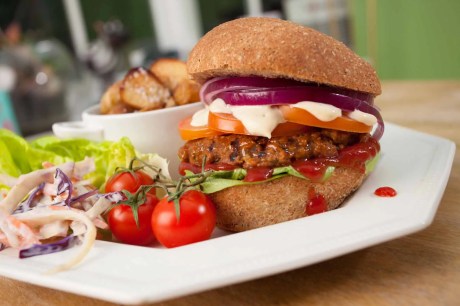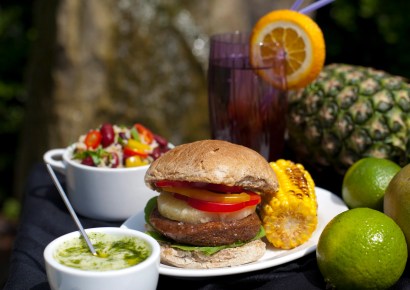Barry Honeycombe is the founder and CEO of Plantalicious Limited, a company selling wholefood plant-based meat substitutes.
How and why did you become vegan?
For me, it was all about health. I’ve been a yo-yo dieter for the majority of my adult life. There is a history of heart disease in my family and my father had a massive heart attack aged 46 and nearly died. At the age of 61 my father passed away. This played on my mind and I spent many years trying to find a way to avoid the same fate. When I reached 51; 10 years off the age my father died, I read “the China study“. This book really changed my life, and may have saved my life! I then studied for a certificate in plant-based nutrition at E-Cornell University and the T Colin Campbell Foundation (M – I have a friend who did this course and highly recommends it).
Following on from this, I happened to be in the US and went to a “Farm to Fork’s” weekend which was held in Orange County. All of the food that was served at this event was whole food and plant-based and I met some really inspirational people. At the end of the weekend I came back to the UK and told my partner that I was changing my diet and I would no longer be eating anything with a face or mother. That was almost three years ago, and whilst initially I didn’t call myself a vegan I have gradually become one. So for me it was an imperative around health that propelled me towards becoming a vegan but as I read and learned more it only made me feel that I was making the right choice.
I hadn’t heard of Farms to Fork. Could you tell us a bit more about what the event involves?
Farms 2 Fork are the events of the Engine 2 Diet which was founded by Rip Esselstyn based on the work that his father did in the prevention and reversal of heart disease using a plant strong diet. The event was a weekend long retreat at a hotel where all of the chefs have been trained in the preparation of a whole food plant-based diet. The event involved various speakers and sessions all about the use of a whole food plant-based diet to revolutionise your health. I met some amazing people who I now count as my “food heroes”. Rips latest venture is a seven day rescue plan that helps people take control of their health through the use of plant-based diets.
Tell us a little about what you do now and how you got to that point.
The majority of my career was spent on aeroplanes and in hotels travelling all over the world, selling analytics to banks and financial services to manage either their risk or their pricing for Silicon Valley software companies. I did this for several companies for about 30 years. I was really fortunate that when I decided to establish my company my then employer, Nomis Solutions, were willing to let me work three days a week for them so that I could use the rest of the time to build my business.
My business came about purely because I was unable to find high quality, delicious plant-based or vegan convenience foods which had the nutritional qualities that I was seeking. All too often when I wanted something quick and convenient all I could find was something that was chock-full of salt, fat and sugar. As a result, I started making my own vegan convenience foods and my friends and partner asked me why didn’t I start selling them. It seemed like a good idea and that was the genesis of the company. We spent the best part of two years developing the products and testing them in various markets across the UK and reformulating them based on customer feedback. Getting customer feedback is one of the most valuable things that we have done to date and that’s really shaped the products that we have today.
So now the company offers five products for retail and seven for foodservice. Our focus currently is on growing our food service business in order that we can use the revenue from this to fund some new packaging for retail. Currently our packaging is functional and only really suited to small independent retailers. We need to do a thorough look to ensure that the packaging connects with the consumer and conveys the key messages that our products are delicious, healthy and made with natural ingredients.
Why do you think having high quality meat substitutes is important for the animals?
What I’ve found is that the better the quality the meat substitute, particularly the flavour and texture, the more likely people are to choose it and consume it regularly. The most obvious market for our products are vegans and vegetarians who already buy our kind of products. However, it’s the flexitarians or people looking for a tasty alternative to meat for Veganuary or Meatless Mondays or organisations wishing to add some meatless options to their menu that really make the difference.
The rapidly growing number of the vegans in the UK was reported recently, however the study also commented on the huge rise in people adopting a flexitarian approach where they eat some meatless meals each week. I think it’s that market where having high quality meat substitutes probably has the most impact for animals. My reason for saying this is that when you’re eating a burger you have a certain expectation as to how it will chew; the resistance and the flavour.
Many products that are labelled “burger” don’t provide that kind of experience for the consumer. What we found is that providing a tasty and familiar product means that people are eating a burger and are not concerned as to where the proteins come from. We are not trying to mimic meat as many organisations seem to be in the US, rather we are trying to give people an alternative which is familiar and comfortable and that meets or exceeds their expectation when they eat it in terms of flavour and texture, and certainly something that is superior when it comes to comparing our nutritional information with a similar product made from animal proteins.
What skills would you suggest are most valuable to learn early for starting and running a great business?
The first word that comes to mind when answering this question is “resilience”. Having not come from the food industry, I entered it with a degree of arrogance. I was confident that because my friends and partner liked my products, that everybody would immediately embrace them, order them, add them to their menus and want to retell them! Being told that somebody doesn’t like your products, or you should change something about them is very difficult for an entrepreneur to accept, let alone act upon.
One of the things that I found very early on was to listen to what customers were saying, whilst holding onto the principles on which I founded the business, I still had to act and respond based to the feedback being given to me. It is extremely hard to maintain positivity when people are criticising your packaging etc. You really do need a robust sense of self belief and belief in your products whilst maintaining an open mind and listening to the feedback that is being provided.
The second skill is one that was said to me many times, and that’s to “know your numbers”. We went through an agonising time when we had to take a very in-depth look at our pricing in order to re-evaluate our pricing strategy and positioning in the market. This was a difficult, time-consuming and a painful process but hugely worthwhile as we came out of it really understanding the costs involved in making our products and the price that is necessary for us and our partners to achieve a margin from them.
The third insight is to be persistent. We all know that JK Rowling didn’t get a publisher for the Harry Potter books on her first try. It’s the same for any new product. Knowing why somebody should buy your product and what the benefit is to them is absolutely imperative. Communicating that is just as important. This goes hand-in-hand with resilience because you will need both to be able to make a success of what you’re doing.
What is your biggest insight on encouraging regard for animals?
The biggest insight for me with regard to animals came from looking at the animal protein based competitors to my products. If a supermarket sells four Aberdeen Angus burgers for £1, then think about how much of that £1 was spent on packaging, advertising and the margin for the producer, wholesaler and retailer. Just how much was left to pay for the ingredients and for the animal husbandry of the animals gave their lives for this product? It made me realise just how the meat and dairy industry behave in order to provide food at the costs expected by the consumer and the supermarkets. The sooner we realise that it makes no sense to turn plants into animal proteins to feed the human race the better.
What one movie, piece of literature or other medium has most shifted your views?
For me, my journey began with the need to improve my health and so the materials that most shifted my views were “the China Study” and the film “Forks over Knives”. The other book then made an impact on me was: “Rethink Food: 100+ Doctors Can’t Be Wrong” as well as the work of Dr Michael Greger.
That we can solve the global obesity crisis and reduce significantly the financial strain on the National Health Service here in the UK simply by the promotion of the widespread adoption of a whole food, plant-based diet.
What is one thing that you believe which almost no one else does?
That we can solve the global obesity crisis and reduce significantly the financial strain on the National Health Service here in the UK simply by the promotion of the widespread adoption of a whole food, plant-based diet.
What’s next for you?
Our strategy as a business is to focus on building our food service partners and then using the cash flow that this creates to finance a complete revamp of our packaging for retail. Our plans then are to promote both retail and foodservice formats of our products and to build the brand through entry into multiple retailers. Simultaneously we will need to look at either ramping up our in-house production or outsourcing the production of one or more products to a third-party as demand increases. Once we are firmly established in both the foodservice and retail markets in the UK we will look at the best models to either export or manufacture our products under licence in other markets that are attractive to us.
Thanks for taking the time to chat Barry!
Definitely check out Plantalicious‘ products, their plant-based burger looks ridiculous.



